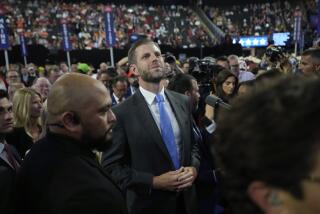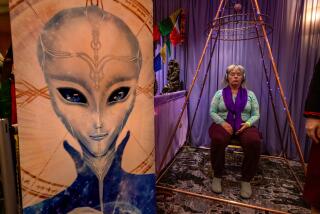Convention Signals Desire to Cast a Broader Message
- Share via
ANAHEIM — About 5,000 evangelical broadcasters, programmers and vendors are flocking to the Anaheim Convention Center today to study the Internet as the next missionary frontier, learn to appeal to Generation X-ers, and exchange ideas with people of “kindred spirit.”
The National Religious Broadcasters’ 54th annual convention, which runs through Tuesday, offers a glimpse of the rich history of religious broadcasting in the Los Angeles basin, as local program producers, ministries and station owners gather for what they describe as the biggest event of its kind.
Program producers scour the floor for station managers to broaden their distribution, stations search for programming, and everyone takes the opportunity to get up-to-date equipment and technology and study the legal issues facing the field.
“The NRB is the granddaddy of all religious broadcasting conferences,” said Harold Sala, president and founder of 34-year-old Guidelines Intl., based in Laguna Niguel.
Guidelines offers five-minute radio programs on family life and other “insights for living” with biblical foundations, Sala said. It is carried on more than 600 stations in a host of different languages.
The event marks the first time the NRB has brought its convention to Orange County, long considered “a hub of Christian activities,” Sala said. The gathering will offer him a chance to network with hundreds of radio and television outlets, and schmooze with station owners who carry his programming.
For decades, the convention remained near Washington, D.C., close to the nation’s halls of political power, where the organization could flex its lobbying muscle. But since 1993, in the wake of several high-profile ethical scandals involving televangelists such as Jimmy Swaggart and PTL’s Jim Bakker, organizers have seen fit to woo a broader base of support. The event was held in Los Angeles in 1993 but hasn’t been on the West Coast since.
“Just the fact that they are out there in California is a very progressive step for the NRB,” said Stephen Winzenburg, a communications scholar at Grand View College in Des Moines, Iowa, who has studied religious broadcasters for more than a decade.
“Now they realize that there’s more to life than politics. Now they’re trying to reach an audience that they’ve never really touched before.” Among that audience are smaller evangelical programmers with toned-down religious messages, many of which operate on a shoestring.
Living Life Ministries, a half-hour Christian cable television talk show based in Laguna Niguel that has aired for little more than a year, is hoping for heavenly growth from the convention. The program, now viewed in 26 cities in South County, will be showcased along with more than 30 other cable shows from around the country.
“We were so thankful to hear it was coming here,” the show’s host, Kim Kihm, said of the convention. “It gives us the opportunity to share the best highlights of our shows . . . and you never know what the Lord can do with that.
“We’re hoping for exposure, for broader distribution, to meet people who could be guests on the show, and people who might get involved in the ministry of Living Life.”
NRB represents more than 800 radio and television station owners and operators, program producers and others “to ensure access to the airwaves for the Gospel” and to see that “the best possible standards are preserved,” organization officials have said.
Ironically, Orange County’s powerhouses of religious broadcasting are not members of the NRB. Paul Crouch, founder and president of the Tustin-based Trinity Broadcasting Network, withdrew in 1990 after an inconclusive yearlong inquiry by the NRB’s ethics committee, which looked into complaints about his business practices and treatment of Trinity employees.
And the Rev. Robert H. Schuller, whose “Hour of Power” television show is the largest nationally syndicated program of its kind, has never expressed interest in being a member, said NRB spokeswoman Sarah E. Smith.
This year’s convention theme is straightforward: Announce His Message. And the lineup of speakers is less political than it has been during some election years. In 1994, Oliver North and six other GOP personalities spoke. Last year, Dan Quayle offered a key address, as did a freshman Republican congressman from Oklahoma.
Tonight’s opening general session features Wellington Boone, of Wellington Boone Ministries in Atlanta. Boone is also one of the most prominent African Americans involved in Promise Keepers--a men’s spiritual movement. He has preached about the sin of racism at Promise Keepers events attended by more than 50,000 predominantly white men.
His presence at NRB signals the organization’s recent efforts to reach out to conservative minorities, Winzenburg said. The NRB has two separate arms for Hispanic and black religious broadcasters but has stated a goal of broader appeal in recent years.
Franklin Graham, the son of the Rev. Billy Graham and his heir apparent, is the event’s other key speaker and will address a luncheon audience Monday.
Exhibitors will present the latest in audio and visual technology, promoters for Christian entertainers and Christian-based publishers will offer up their latest talent in hopes of boosting their visibility, and more than 40 educational seminars indicate the eagerness with which NRB has kept pace with the times.
One teaches attendees about “Generation X and the Irrelevant Church,” pointing out that twenty-somethings are the future of every ministry: “Art, music, buying trends, clothing, speech are all being changed by the enigmatic generation in modern history,” the catalog states. “Find out who they are, what they believe and how to reach them.”
This year’s convention also stresses international work, as more and more ministries expand outside the United States, Smith said. One workshop examines the hand-over of Hong Kong to the Chinese government and implications for the myriad ministries active there.
Others offer training in the next frontier for broadcasters who have already conquered satellite communication. “Is your ministry ready to present the Gospel online?” one session poses. Another offers training for international ministries on “use of the Internet both as a tool of evangelism among global ‘surfers,’ and to link Christian media groups worldwide.”
“For us, it is the next frontier--the one we are getting ready to cross,” said Charles Stewart, president of Hermano Pablo Ministries, a radio ministry based in Costa Mesa since 1964.
In addition to keeping up with the latest technology in areas of mass duplication of audio and video, Stewart said he is planning a meeting to consider putting the program on the Internet, complete with audio and visual elements.
The forward-looking bent has meant a new direction for the organization, slowly healing from wounds created by high-profile scandal in the 1980s that partly tainted televangelism with the image of an unethical old-boys network.
Then, PTL founder Jim Bakker withdrew from the organization and, after an investigation, evangelist Jimmy Swaggart was dropped. Bakker was marred by a sex-and-money scandal that sent him to federal prison and Swaggart’s reputation was also tainted by sex scandal.
The scandals prompted the NRB to implement strict financial and ethical accountability standards for larger ministries that are still in effect.
“I think one of the things that the PTL scandal did was force the NRB to rethink their position in public,” said Winzenburg, the Des Moines communications professor. “Many people became skeptical of religious broadcasters. Many people saw them as old-fashioned. So they began to update themselves, to make sure they were on the cutting edge.
“The NRB today is keeping up with the technology to appear contemporary, but at the same time very Christian,” he said.
The convention location is also a gesture to commercial broadcasting in the area. The ABC Radio Network and CBS Studio Center are among those sending representatives.
Winzenburg, the NRB spokeswoman, and some participants also noted a trend to tone down the message, moving away from a hard-core religious sell to programming focused more on family values, and Bible-inspired guidelines for living a moral life.
Hermano Pablo Ministries, which airs on more than 2,000 radio stations and in more than 27 countries, “is intentionally not a hard sell,” said the organization’s president, Charles Stewart.
The ministry is named after founder Paul Finkenbinder, known all over Latin America as Hermano Pablo, or “Brother Paul.”
“We had a station owner in Lima, Peru, comment that what he liked so much about the program was that it was the only one he knew about that was spiritual rather than religious sounding,” said Stewart, who will attend the NRB convention. “We eliminate religious jargon.”
More to Read
Get the L.A. Times Politics newsletter
Deeply reported insights into legislation, politics and policy from Sacramento, Washington and beyond. In your inbox twice per week.
You may occasionally receive promotional content from the Los Angeles Times.











